|
||||||||||||||||||||||||||||||||||||||||||
|
Press
|
||||||||||||||||||||||||||||||||||||||||||
|
An
article from the March 2007 South Windsor Life Publication.
Tired of touring around the United States and Europe for five years, Savoy Brown band drummer/percussionist Dennis Cotton has settled down in South Windsor with his family. “After about three years I had seen and done it all. The fourth year was just going back and playing to the same people and venues,” said Mr. Cotton. Sporting a braided goatee, this internationally known musician looks much younger than his 38 years. His career was difficult on him and his family, because he couldn’t be with them very much. “It was hard hearing my daughter’s first words over the telephone in a diner.” Finally, during a telephone call from a Midwest hotel room before leaving for Germany, he talked with his wife, Veronica about changing their lives. She didn’t like her job and he needed to move on. So, they decided to sell their house in upstate New York and make a new start. After she evaluated job offers from Richmond, Va. and Hartford, they opted for Connecticut, because Mrs. Cotton’s sister, Zane Colabrese and her family live in South Windsor. Mrs. Cotton accepted a job as account executive at Travelers Insurance. “We love the schools and where we’re located,” near Timothy Edwards Middle School, Mr. Cotton said. “We love that we’re close to everything, because you had to drive 45 minutes to buy underwear where we lived. My daughter had an hour bus ride to school each way.” Smiling broadly and shouting excitedly, he said, “The library. Oh my God. The library. I could just scream about that…They have paid staff. What a concept. Everything is voluntary in upstate New York … You can take home a painting (in South Windsor). It just blew my mind.” He believes you can tell a lot about a community by its library. “If the library seems together, we know it’s a community that works together.” South Windsor has a sense of pride in itself and “The people here are so nice.” And they love being close to Boston and New York. In December, he traveled to Boston to take a three-day, intensive course with Wadaba, a master African djembe drummer. Mr. Cotton loves talking about all the pluses of their new life. He no longer has to check with an agent or record company before he can go on vacation, make plans with his family, do a solo gig, or make a record. Additionally, he is facilitating a free drum circle every month at Rockville Bank on Ellington Road. [Since this article,the circle has moved to the South Windsor Community Center] No prior musical experience is needed to join the group and all ages are welcomed. Participants may bring their own drums or other musical instruments, such as shakers or triangles, but he said he brings a “garage full” to share just in case. He started the drum circle in October. “They had their own drums…people I would never have imagined, retirees, with beautiful djembes (African drums) and they play well.” Jaime Arias of Hebron has been coming to Mr. Cotton’s drumming since it started, even though he facilitates a group of his own at Samadhi Yoga Studio in Manchester. “He is able to bring the whole group into unity. He is able to take a rhythm and divide it and bring it back,” he said of Mr. Cotton. Modern drum circles with facilitators first began in this country in the 1960s with drummer Arthur Hall of Santa Cruz, CA., Mr. Cotton said. In a drum circle, there is no real leader, only facilitators. “I start with a rumble. I tell everybody to take off their rings and things and we … just make a noise … Just get used to it.” At first, they just practice playing loud and then soft, starting and stopping and before they realize it,” he said, “they’re all playing together one beat” without him. “The more adventurous ones at this point will add something else and the ones who don’t know what to do will just keep on that beat and they’ll see other people taking off and they’ll start their thing. The next thing you know, they’re working and they’re doing it on their own.” If the drumming starts to waver or shake, he jumps in and straightens it out. “There are no mistakes … You’re accepted. You’re part of the community. It’s a very powerful thing.” Many people tell him they can’t drum because they don’t have rhythm or any musical talent, which he said, is not true. If one has a pulse, one can drum. From the moment we’re born, he said our hearts are beating and our lives are in sync with rhythms of all kinds – the life cycle, ocean, music on the radio, even the washing machine. It’s true. Just ask Deborah Ruggiano of Manchester. In drum circles, she said people such as herself who don’t necessarily view themselves as musicians or capable of making music are making music with other people. She described her reaction in the beginning as, “Wow, I’m doing this? I’m making music with other people and it sounds wonderful.” Quipping that he is a drumming evangelist, Mr. Cotton belongs to the Drum Circle Facilitators Guild, which doesn’t believe in connecting any kind of agenda, religious or otherwise, to drum circles. Members also believe in tithing 10 percent back to the community and his free drum circle is one of the ways he does that.
Mr. Cotton formed a business called Power of the Drum. He is available to facilitate drum circles at people’s homes and other locations, something he has only done as a hobby for the last 15 years. During the recent winter solstice, he got his first calls. His fee is flexible for these two-hour events depending on the cause and people’s ability to pay. Generally, they range from $50 to $200. For school systems and corporations, he introduces various teambuilding exercises such as “Pieces of Eight,” that show how each small part creates a very powerful piece of music. It’s an equalizer and it’s a setting where students who normally don’t talk to each other, connect. This, he said, can help stop bullying. Speaking from personal experience, Mr. Cotton said he was bullied in school because he didn’t play sports. Then the bullies saw him play drums. “And then it was like, ‘Dude, you’re good,’ and then I wasn’t bullied anymore. I was respected by the kids who hated me … Suddenly, I went from being the weird one to being the popular one in school. Why? Because I play drums.” While creating music together, people are also expelling a lot of stress and frustration, he said. “Kids these days are more stressed than anyone realizes. Here, we’re giving an outlet to a kid, who isn’t good at basketball, lacrosse, drawing, or math. But they can get on a drum and beat the hell out of a drum and feel better and sound great and perhaps find something that they’re good at, that’s different, that the school may not be giving them.” The drum circle can also be very physical if people want it to be, which is why he encourages people to bring water to stay hydrated. Delann Zanks of Ellington said, “It gets your adrenaline going so much and your blood circulating and you just feel fantastic.” Mr. Cotton always stands and puts his whole body into it when he plays a drum laid on its side called a dundun. Besides helping people form friendships, raising people’s self-esteem and working on one’s body, mind and spirit, Mr. Cotton is fascinated most by the shamanic aspect of drum circles. “For some reason through the ages, especially Native Americans, have used the drum as medicine.” Mr. Cotton said master teacher Wadaba, told him that “In his community in Africa, drumming is medicine. Drumming gives you courage. Persons, who are too sick to drum or to dance, will do it in their heads.” The body has a kinesthetic response to drum circles that helps people with Alzheimer’s disease and mental sicknesses, Mr. Cotton said. “It moves beyond the brain and goes directly to the body.”
Musician as teacher and performer In addition to his drum circle work, Mr. Cotton has 16 drumming students, including his daughter, Anna. He taught for 17 years in New York, many of the students aspired to be professional musicians. “Not only did I teach them the basics, but I also taught them a lot about the business…The parents used to love me, because I didn’t really glamorize it at all for them. I let them know the ugly parts…I would come home from tour looking like crap, run down, complaining and say, ‘This takes a lot out of you and can potentially shorten your life, but you do it because you have to. You don’t choose to play music. It chooses you.’” Most important role is being dad All these activities, however, must work around his most important job – that of being a stay-at-home dad. This means being there when six-year-old Anna gets out of school and sometimes bringing her to karate classes, Brownies and soon, T-Ball. Three-year-old Quinn has his own schedule. After proudly watching his son play the drums, he said, “Here’s your chocolate milk buddy.”
Right place, right time A lot has happened since Mr. Cotton began playing drums in fifth grade and for a brief time, the saxophone. That summer, his band teacher gave him a beat-up old drum set to practice on during the summer. “I guess he saw that I had some natural ability. By sixth grade, I had taught myself to play” and was in the school’s jazz band and a drum set player. He was also helped along by his drumming idol, Tom Delfavero, who was three years ahead of him in school and later was a member of the Hell Cats.
“Why my parents let me do it, I don’t know … I was the third kid. I guess I was headstrong. I was a good kid. I never got involved in drugs or drinking.” From the beginning, he said they realized that he liked music and “were unbelievably supportive of this whole thing.” While playing with different bands after high school and recording, he got a call from the manager for Gary Nichols, a country act. Mr. Cotton spent five years traveling with him and performing at country fairs all over the Northeast and opening for many famous country artists during the late 1980s and early 1990s. During this time, he learned a great deal from his mentor, bass player Mitch Powell, who in the 1960s was a drummer for a television network. Mr. Powell knew how to play drums and had the touring routine down pat, Mr. Cotton said. In the best way possible, he said he gave him advice. “One of the things that drummers tend to do during soundcheck, especially starting out, is play a whole lot of stuff, and he would be like, ‘No, no don’t show them your stuff. Keep it for the show. Nobody wants to hear you play now, they want to hear you play with the band.’” Once Mr. Nichols and the band moved to Nashville for his career and there wasn’t much work, Mr. Cotton returned to New York. For the next five years, he toured with the Don Lewis rock-and-roll band and made three records. After they were signed to Detonator Records, a division of SONY, and it didn’t sell well, their contract was not renewed. This was difficult for the band, because they were very close, everything was going great and suddenly they were dropped. Even though they had radio hits, Mr. Cotton said people weren’t buying their records. At this point he was in his mid-20s. He posted some advertisements on the Internet searching for work, from which he got two calls – One was from the Dent; the other was from the Mighty Purple. He chose the Dent, a Power Pop band, which is a mix of Top 40 and punk music. “Artistically, I had to be involved with them … t kept that side of my playing alive while I went to the blues too.” He was also working with Bobby Charles in New York. His big break came soon after his 30th birthday in January 1999, when he recorded a record with Mr. Charles, which was being produced by Duke Robillard (a huge blues name). When they all met up again three months later while billing together at an outdoor festival in Ft. Pierce, Fla., Mr. Robillard said his new drummer wasn’t working out and asked him if he would join his band to finish out his tour in the states and Europe for his new record, “New Blues for Modern Man.” “It was a very easy choice to make, because Duke was Duke. It’s a huge name and Duke worked a lot and it was Europe, a good label,” Mr. Cotton said. A year later, Mr. Cotton began working with George Fletcher, another blues act. Through contacts, he was pulled into Commander Cody, known for the hit, “Hot Rod Lincoln.” By this time, Mr. Cotton was being perceived as a “blues expert.” Joining Savoy Brown made him a British Blues expert. “Through them, I got to play with the British Blues All-Stars,” an experience he described as an opportunity to play with the greatest guys in British blues. “That dissolved because three of the members of the band died,” including Long John Baldry, the father of British blues. Mr. Baldry discovered both Elton John and Rod Stewart. “Most solo people work their way through other artists. “You kind of have to cut your teeth on the road and learn how things work, sort of as an apprenticeship.” Mr. Cotton is still part of a band called the Vantwistics that for the last 18 years has periodically gotten together to perform in New York. The two other key members are bass player/singer Annie Hat, Broadway actress and former Saturday Night Live performer and Tom Delfavero, who switched from drums to guitar. Back to the present Though he is not turning away completely from performing, Mr. Cotton’s future goals sound more altruistic. “I have spent 20 years of my life devoted to drumming and I can see that it makes a difference in people’s lives. “And now I’m going to stop being the
rock star with the focus on me and I’m going to start doing
this for other people. I walked away from a ton of money, fame
and a lot of stuff because I feel like there’s something
else that I can do that’s more important than getting up
on stage.”
Dennis Cotton’s free drum circle event is
held at South Windsor Community Center, 150 Nevers Road, South
Windsor, CT. Dennis Cotton’s drumming is featured on new records by artists Charlotte Kendrick, Bobby Charles and Savoy Brown |
||||||||||||||||||||||||||||||||||||||||||


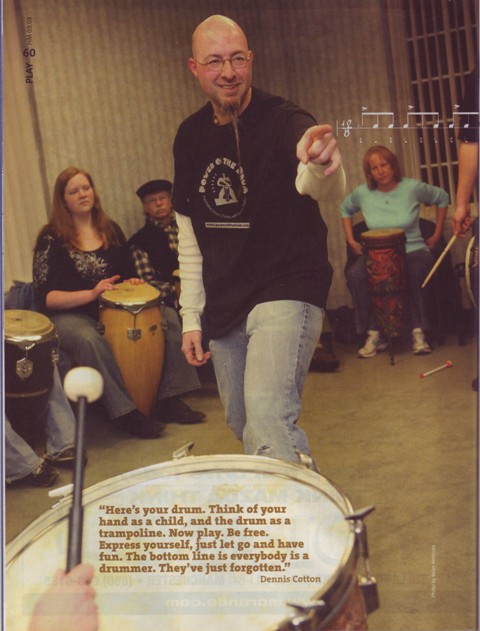
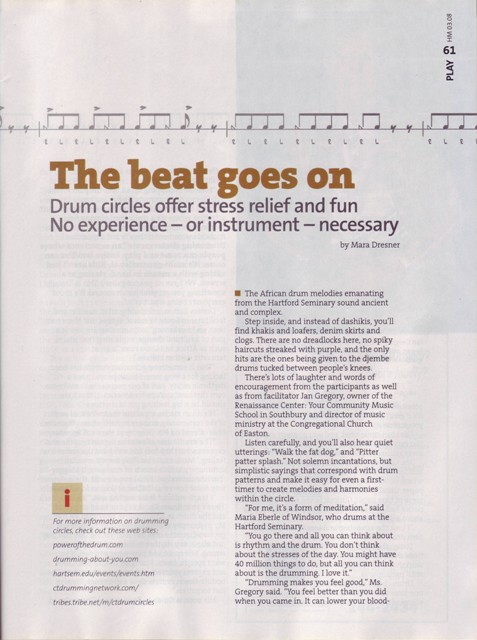
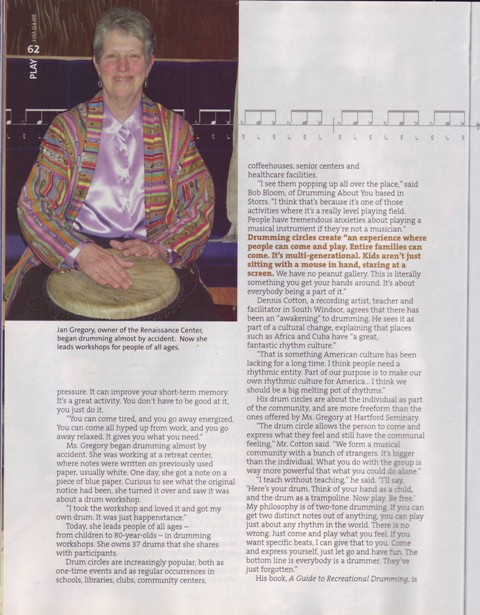
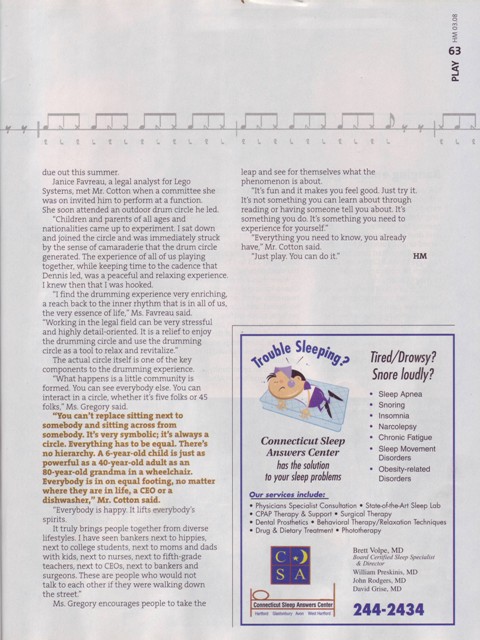

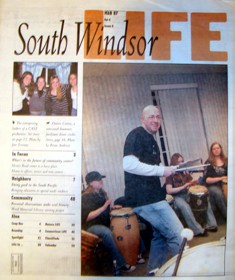 From Savoy Brown to South Windsor
From Savoy Brown to South Windsor 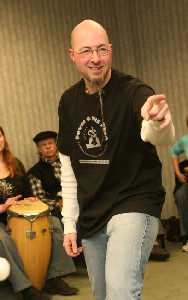 Musician starts news business
Musician starts news business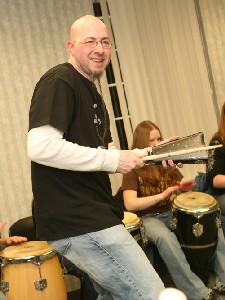 During
Mr. Cotton’s senior year, he joined a Top-40 band and spent
most of the year on the road performing in hotel lounges. On the
way home on Sunday nights in the van, he did his homework. Sometimes,
they wouldn’t get paid, because the club owners would find
out that he, but usually the band’s female keyboard player/vocalist,
was underage.
During
Mr. Cotton’s senior year, he joined a Top-40 band and spent
most of the year on the road performing in hotel lounges. On the
way home on Sunday nights in the van, he did his homework. Sometimes,
they wouldn’t get paid, because the club owners would find
out that he, but usually the band’s female keyboard player/vocalist,
was underage.